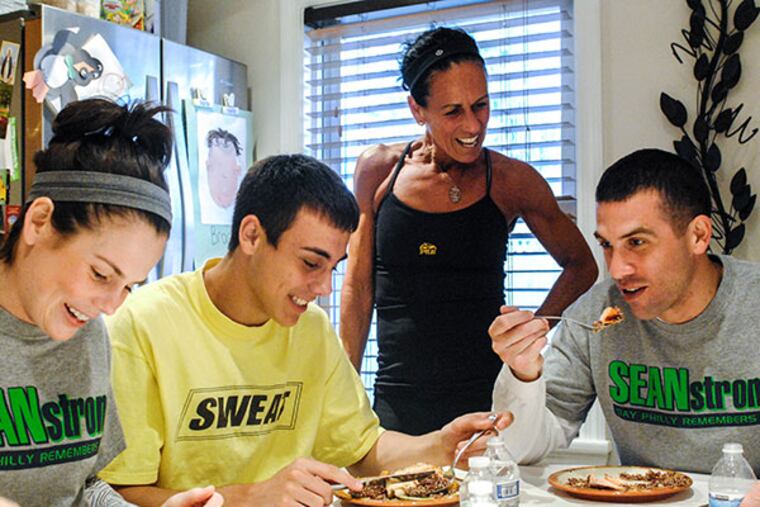Long-distance eating takes planning, not tons of food
When youre training for a marathon or 10K, everything you eat has an impact.

IN THE 34 YEARS she's been in the fitness business, Donna Storm has worked with plenty of runners. And the No. 1 mistake she sees them make is overdoing the carbo-load before a race.
Storm, director of fitness for Sweat Fitness gyms, will warm up runners at the 10-mile Blue Cross Broad Street Run for the 19th year in a row May 4. Among the 40,000 sprinters will be her sons Cole, 15, and Brett, 32, and daughter-in-law Melissa, 33.
"Everything we eat and drink has an impact on our performance," said Storm, of Blue Bell. "Flooding your system with more carbs than it needs will leave you feeling bloated. I'm all about taking a balanced approach. And a 10-mile run is a lot different than a marathon. You really can take a more moderate approach to what you eat."
One of her favorite training meals combines Omega-3-rich salmon with the supergrain quinoa (pronounced "keen-WAH"). "It's a really well-balanced meal, and it's super delicious."
As the 35th annual Broad Street Run nears, the best approach for runners - and, let's face it, the rest of us, too - is to put real, whole, fresh food in our mouths, not processed junk.
The carbs runners do eat, said Storm, should be rich in whole grains as opposed to just any old bread and pasta.
And remember that you can gain unwanted weight even while training by setting up a reward mentality. A 150-pound person burns 563 calories running 5 miles at a pace of 12 minutes per mile, according to nutristrategy.com. Think about that before you tuck into two cups of post-run pasta - 780 calories' worth before you add sauce.
Drink up
"Performance is most affected by hydration," Storm said. "Water, water, water, all the time, is an essential part of a runner's fuel. And it's just a great habit to work into your life in general."
She's talking plain, old H2O. Enhanced waters and sports drinks can add unnecessary sugar and additives, although "endurance drinks are OK if you are running long-distance. Same goes for recovery drinks after a race or a tough workout, especially when exertion makes solid food unappetizing."
South Philly personal trainer and chef Michael Scipione wants his runners to focus on complex healthy carbs leading up to a race. "A 150-pound person should eat about 2,400 calories and 300 grams of carbohydrates the few days before the race," he said. "Add in lean protein and a minimum of healthy fats, and your body is not going to hit the wall."
Fuel up on about 150 grams of carbs three hours before the race, even if you have to get up early to do it, said Scipione, who recently designed a healthy-recipe app, The Big Sexy, available on iTunes.
"For every four grams of carbohydrates that a body consumes, you retain three grams of water," he said. "Compare that to a car, and it means your gas tank is full enough to make it to the finish line."
Scipione favors organic honey as a midrace pick-me-up over something like GU Energy Gel, which relies more on simple processed sugars. "Honey goes right into your reserve tank to give you a spike of energy," he said.
Help in the gym
Although she's not a race runner, New Jersey personal chef Jerzy Gonzales runs just about every day at the gym. If she's pushing it, Gonzales' go-to meal combines pasta with lean protein and tomato sauce - sort of a healthy chicken parm. "I just eat a normal portion," she said. "Otherwise, too much food will slow you down."
As CEO of DelMoSports and race director of the Atlantic City International Triathlon, taking place this year Sept. 14, Stephen Del Monte has plenty of experience with runners.
"Complex carbs are essential for endurance athletes," he said. "Think of it this way: You can throw newspaper into a fire and watch it burn bright for a minute, or you can place a Duraflame log on the fire and watch it burn for hours. Complex-carbohydrate sources like whole-grain breads, starchy vegetables and beans deliver fiber as well as valuable amounts of vitamins and minerals."
There's one important ingredient to a runner's recipe for success that has nothing to do with carbohydrates, he added. "Getting plenty of z's during training and the night before the race can make or break a runner's performance."